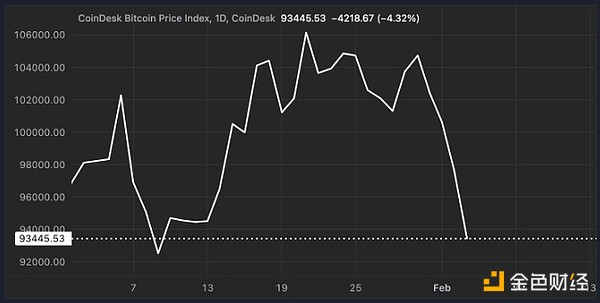
Author: Leo Mindyuk, CoinDesk; Compiled by: White Water, Golden Finance
Bitcoin (BTC) plunged over the weekend, falling below $100,000 as markets responded to the latest escalation in the U.S. trade dispute. The broader digital asset market also followed, leading to one of the worst selloffs since the Covid outbreak and the FTX crash. Specifically, President Donald Trump announced a new tariff of 25% on goods imported from Canada and Mexico and a new tariff of 10% on goods.
Canada and Mexico initially retaliated, but later reached an agreement to postpone tariffs on U.S. goods and announced tariffs on U.S. goods. These developments have increased uncertainty in the global economy and have led to temporary free fall of risky assets.
As the global economy falls into a trade dispute, the cryptocurrency market faces ripple effects such as price volatility, mining disruptions and regulatory challenges. But will these tensions also fuel the rise of decentralized finance? Let's explore how the tariff war will affect the future of cryptocurrencies.
BTC's reaction to tariff announcementsMarket fluctuations: a double-edged swordTariff war brings uncertainty to traditional markets, often prompting investors to turn to Bitcoin and Ethereum alternative assets such as cryptocurrencies and other cryptocurrencies. During times of economic turmoil, cryptocurrencies are sometimes seen as "safe haven" similar to gold. However, even as institutions’ adoption of cryptocurrencies continues to grow, digital assets remain highly speculative. In the short term, cryptocurrency markets will be negatively affected by intensified global trade volatility, and trade changes will lead to sudden rises or falls – but over time, cryptocurrencies will be less affected than traditional finance.
Mining interruptionCryptocurrency mining relies heavily on dedicated hardware, most of which are produced by et al. Tariffs on electronic components, semiconductors and mining equipment could drive up production costs and reduce profitability. Additionally, increased fees may squeeze small miners out of the market, potentially leading to more concentrated mining capabilities on having resources to withstand major players in these financial storms.
Regulatory uncertainty and compliance barriersTariff wars affect not only physical goods; they also affect financial regulation. Those involved in tariff wars may use financial regulation as an additional tool to impose control. Intensified scrutiny of international cryptocurrency transactions, exchanges and cross-border payments may lead to stricter compliance requirements. This in turn may slow adoption rates and make cryptocurrencies more difficult to access, especially in areas where trade restrictions are tightened. Meanwhile, strengthening regulation may push some users toward decentralized finance (DeFi) platforms that operate outside traditional banking systems.
Turning to Decentralized Finance (DeFi)As trade conflicts intensify distrust of traditional financial systems, Decentralized Finance (DeFi) may provide users with a place to bypass tariffs and regulatory agenciesMethods of some obstacles caused. More users may turn to the DeFi platform to achieve financial autonomy. DeFi applications allow peer-to-peer transactions without intermediaries, thereby reducing reliance on traditional banks, which are often affected by trade. If the tariff war continues to disrupt traditional trade channels, cryptocurrency-based financial solutions may get more adoption.
ConclusionWhile cryptocurrencies are often seen as a means of hedging economic instability, they are not immune to tariff wars. From increased volatility and mining costs to regulatory changes and the potential rise of DeFi, today’s trade conflicts could shape the digital economy of the future. While cryptocurrencies may face new obstacles in the short term, cryptocurrencies will become stronger in the long term as global markets seek alternatives to traditional finance in the ongoing global economic war. Investors, miners and makers should pay close attention to trade developments when dealing with complex relationships between geopolitical and digital assets.











